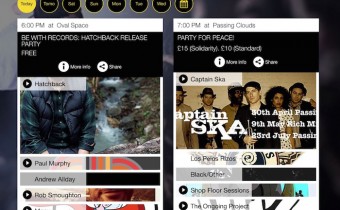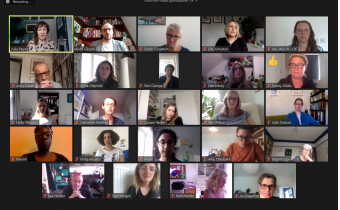Traditional folk veterans in a slick new venue are “utterly heartening”
Eamon Murray calls them “one of the most influential vocal groups of all time” and a “massive part” of his own musical heritage. Evidently much of the audience at Belfast’s Metropolitan Arts Centre feels the same. It’s been years since The Voice Squad last performed in the city but a hearty cheer goes up when the three grey-haired gents walk across the stage in smart black concert gear and take to their vocal mics like old pros.
The Voice Squad was at the heart of Ireland’s folk scene in the 1980s and ’90s, despite the fact that their a-capella close harmonising was more an English than an Irish style of traditional singing. Around the turn of the millennium the Dublin trio more-or-less stopped performing together, but since 2012 have been gradually re-taking to the stage. For Murray, bringing them to Belfast for the first time in decades feels like “a bit of a coup”.
Murray himself is one of today’s finest young bodhrán players and fast emerging as a talented events producer in and around Belfast. The idea behind his Not So Trad series at the MAC is a simple one: to present traditional Irish folk singing in a venue whose slick contemporary aesthetic wouldn’t tend to attract a folk-club crowd. The MAC opened in 2012 in the heart of Belfast’s swishly revamped Cathedral Quarter and is still sculpting its role and image in the city. It’s a stunning building, no question. The entrance is flanked by stark basalt columns. Galleries, meeting rooms and studios are finished in sleek pressed concrete and Belfast brick. The cafe and a foyers are decked out in stylish mid-century furniture. The concert takes place in the main theatre, a plush 300-seat black box of a space with raked seating and full stage flies. No scruffy folk club, this.
Part of Murray’s mission was to see how a folk audience would take to the glamorous MAC, and how a MAC audience – if such a thing exists – would take to traditional music. From the look of the audience around me I’d guess that a bit of both is happening, but the balance weighs on the former. Even the MAC representative who shows me around the galleries isn’t sure that the centre has yet managed to build a regular audience of its own; it’s too new, he says, and still defining itself. An upbeat folk trio sets up camp in the cafe during the interval, and the atmosphere around them has the buzz of a cosy pub (without the sticky carpets). It might still be defining itself, but the MAC is happy to play the convivial host.
The concert itself focuses around The Voice Squad. They’re on first, singing traditional ballads with all the soul of their early albums but a weathered fragility to their voices that makes them even more touching. After a few numbers they introduce Pauline Scanlon, a singer from Dingle who delivers impassioned renditions in an earthy, soft-grained voice. “Songs are the emotional memory of events,” she says before launching into The Foggy Dew about the Dublin Easter Rising in 1916.
Next enters John Spillane, a Cork singer/songerwriter with brilliantly daft banter (he calls himself ‘the hit factory’) and a tender, thoughtful heart to his songs. In general there’s an easy continuity about the evening: each singer introduces the next until a fleet of eight musicians is ranged across the stage. They join in with each others’ solo songs and add impromptu harmonies. The younger singers clearly hold a great deal of respect for the esteemed Voice Squad, but the reverse also seems true: during Scanlon’s solo numbers the Voice Squad members listen intently, tap their feet and mouth along to the choruses.
With such a fine gathering of voices it’s a shame that the MAC’s amplification is so heavy-handed, distorting the balance and generally set too loud. The concert would probably work acoustically; the theatre is dry, but the voices are strong enough to compensate. It’s also notable that of the eight musicians on stage, Scanlon is the only woman, and that she doesn’t play her own accompaniment (she leaves that to guitarist Donogh Hennessy). I’m told that this is normal in Irish folk music, but to a foreigner the gender imbalance stands out.
What also stands out is the warmth and camaraderie between the musicians on stage and the audience in the stalls. “This town has changed a lot since we were last here,” says the Voice Squad’s Phil Callery. “So much for the better. Well done, Belfast!” The evening closes with a Christmas carol: normally a no-no in November, but this eight-voice rendition of The Holly Bears a Berry is utterly heartening.
* Eamon Murray and the mac have been brought together as part of New Music Plus.. developed in partnership between PRS for Music Foundation and the hub, the project enables 12 independent producers to work with an arts organisation to co-produce a series of music-led cross-artform events.



